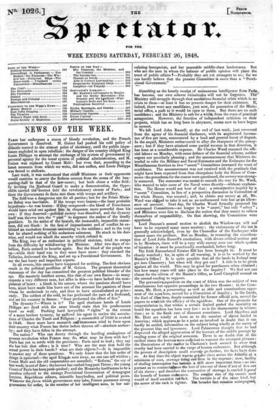NEWS OF THE WEEK.
Paws has. undergone a storm of bloody revolution, and the French Government is dissolved. M. Guizot had pushed his cold policy of didactic control to the utmost point of obstinacy, until the public impa- tience exploded in open rebellion: the danger of the country obliged King Louis Philippe to attempt the exchange of his system of government by personal agency for the usual system of political administration, and M. Guizot was replaced by Count Mold: but even that, according to the latest accounts from which we write, did not suffice, and Louis Philippe was forced to abdicate.
Last week, it was understood that eithg Ministers or their opponents would contrive to 'carry the Reform contest from the arena of the ban- queting-hall to that of the law-court ; but both chose a wider field : by inviting the National Guard to make a demonstration, the Oppo- sition carried thecontest into the revolutionary streets of!
-' Paris; and there the Government de facto met them with troops and artillery.
The field was a dangerous one for all parties; but for the Prime Minis- ter defeat was inevitable. If the troops were beaten—the least probable hypothesis—he was beaten : if they conquered—the blood of Frenchmen would have cried out against him in eloquence more powerful than his own : if they deserted—political society was. dissolved, and the dynasty itself was thrown into the " pool" to augment the stakes of the deadly gamblers. In the midst of the tumult, the inexorable, impassible states- man, did not flinch : in the face of impeachment and of conflict he ex- hibited an unshaken firmness amounting' mounting to the sublime; and to the very last he abated nothing of his audacious calmness. He stack to his doc- trine, and would not admit the anarchy which refuted it. The King, less of an enthusiast in political stoicism, tried to escape from the difficulty by withdrawing the Minister. After two days of re- bellion, Paris seemed to breathe again. But the blood of the people was up—while their hand was in they must have more : they stormed the Tuileries, dethroned the King, and set up a Provisional Government. So say the last hasty and imperfect reports.
At all events, this cannot have happened for nothing. The first obvious result is the political perdition of M. Guizot. The greatest theoretical statesman of the day has committed the greatest political blunder of the age. His masterly intellect seems, like that of our own Bacon—in many respects a very different man, but alike in this—to have lacked the com- plement of heart : a blank in his nature, where the passions should have been, must have made him leave out of the account the passions of those whom he undertook to rule, and thus to have miscalculated so griev- ously. The coldest of the cold, he has performed the part of a firebrand, and set his country in flames : "frost performed the effect of fire." The dynasty ?—Where is it? The aged obstinate bands of Louis Philippe are dyed with the same bloody stain that his predecessors knew so well. Pushing hard lawyerlike " rights" to the extent of a more lawless tyranny, he spffered his agent to revive the associa- tions of Charles the Tenth and Mignon : a counterfeit of 7830 is evoked in 1848. Once more have monarch antrstatesman tried to force upon their country what France has thrice before thrown off—absolute author- ity; and they have fallen in the attempt. .
The nation ? Who can descry through the hurtling atmosphere of present revolution what France may do, what may be done with her ? Paris has yet to settle with the provinces : Paris used to lead ; they say she has lost that office ; is it true? Who are the men that hold the actual power in their hands ? what are their objects?—It is impossible to answer any of these questions. We only know that the late order of things is upturned—the aged Kingais sent away, no one can tell whither ; Count Mole and the old respectables are annulled; "Reform," the cry of last week; is out of date ; the torrent has rushed long past niers ; the young Count of Paris has been pooh-poohed; and the Monarchy itselfseems to be a question referred to the strange Provisional Government of demagogue lawyers, Republican editors, scientific busybodies, and political poets. Whatever the form which government may take, France possesses strong guarantees for order, in the number of her intelligent sons, in her cal- culating bourgeoisie, and her peaceable middle-class landowners. But who are the men in whom the balance of public opinion will place the trust of public affairs ?---Probably they are yet strangers to us ; for we can hardly believe that the present Committee is more than a "Provi- sional Government."


























